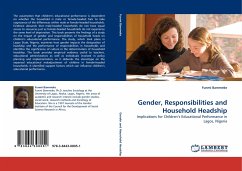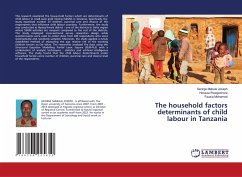
Gender, Responsibilities and Household Headship
Implications for Children''s Educational Performance in Lagos, Nigeria
Versandkostenfrei!
Versandfertig in 6-10 Tagen
52,99 €
inkl. MwSt.

PAYBACK Punkte
26 °P sammeln!
The assumption that children's educational performance is dependent on whether the household is male or female-headed fails to take cognizance of the differences within male or female-headed households. Evidence abounds that male-headed households do not have equal access to resources just as female-headed households do not experience the same level of deprivation. This book presents the findings of a study on the impact of gender and responsibilities of household heads on children's educational performance. The study, which took place in Lagos State, Nigeria, examines how gender impacts the d...
The assumption that children's educational performance is dependent on whether the household is male or female-headed fails to take cognizance of the differences within male or female-headed households. Evidence abounds that male-headed households do not have equal access to resources just as female-headed households do not experience the same level of deprivation. This book presents the findings of a study on the impact of gender and responsibilities of household heads on children's educational performance. The study, which took place in Lagos State, Nigeria, examines how gender impacts the designation of headship and the performance of responsibilities in households and identifies the significance of culture in the determination of household headship. The book provides empirical evidence useful to teachers, educational administrators as well as individuals involved in policy planning and implementation, as it debunks the stereotype on the expected educational maladjustment of children in female-headed households. It identified support factors which can influence children's educational performance.












